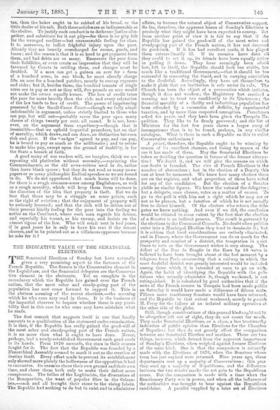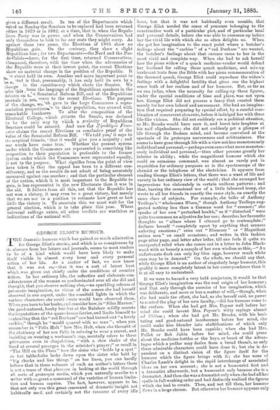THE INDICATIVE VALUE OF THE SENATORIAL ELECTIONS.
THE Senatorial Elections of Sunday last have naturally given a very promising aspeol to the fortunes of the French Republic. The Senate is the Conservative element in the Legislature, and the Senatorial delegates are the Conservative element in the electorate. Yet so complete is the ascendancy which the Republic has gained over the French nation, that the most sober and steady-going part of the population has now come forward to support it. This is the obvious meaning of the recent elections,—the meaning which he who runs may read in them. It is the business of the impartial observer to inquire whether there is any possibility that in this case he who runs may have mistaken what he reads.
The first remark that suggests itself is one that hardly amounts to a qualification of the statement under examination. It is that, if the Republic has really gained the good-will of the most sober and steady-going part of the French nation, it is no more than what it ought to have done. Never, perhaps had a newly-established Government such good cards in its hands. From 1870 onwards, the stars in their courses fought for it. The fact that the Republic was founded by a Monarchical Assembly seemed to mark it out as the creation of destiny itself. Every effort made to prevent its establishment only showed more plainly the hollowness of the opposition it had to encounter. Its enemies chcse their own ground and their own time, and chose them both only to make their defeat more conspicuous. The follies of the Legitimiets, the dissensions of the Bonapartists, the want of popular fibre in the Orleanists,—each and all brought their stone to the rising fabric. The Republic had nothing to do but to exist and to administer
affairs, to become the natural object of Conservative support, So far, therefore, the apparent lesson of Sunday's Elections is precisely what they might have been expected to convey. Yet from another point of view it is fair to say that if the Republic has gained the good-will of the most sober and steady-going part of the French nation, it has not deserved its good-luck. If it has had excellent cards, it has played them extraordinarily ill. If its enemies have done all they could to set it up, its friends have been equally active in pulling it down. They have seemingly been afraid lest, left to itself, the Republic should look too stable, too much like a traditional Government,—that it should be too successful in reassuring the timid, and in carrying convictive to the doubtful. Accordingly, they have set thetnselvee to make it plain that no institution is safe under its rule, The Church has been the object of a persecution whicle irritates, though it does not weaken ; the Magistracy ha st received a warning not to trust to confidently to its !.(e-tenure; the financial morality of a thrifty and industrients population has been offended by a succession of defieits, by experimental taxation, and by more than suspected corruption. Frenchmen, asked for peace, and they have been given the Tonquin Expedition. They like to be firmly governed ; and the list of Ministers for the last few years shows a larger array of incompetence than is to be found, perhaps, in any similar catalogue. What is there in such a Republic as this to enlist. Conservative enthusiasm?
A priori, therefore, the Republic ought to be winning by reason of its excellent chances, and losing by reason of the use it has made of them. May the Senatorial Elections be taken as deciding the question in favour of the former alternative? We doubt it, and we will give the reasons on which our doubt is founded. The vice of French Elections is the number of abstentions ; but in the election of a Deputy this can at least be measured. We know how many electors there are on the register, and what proportion of them have voted
for any of the candidates. But the election of a Senator yields no similar figures. We know the votes of the delegates ; but a delegate, once chosen, votes as a matter of course. To go to the poll is with him not a right which he may use or not as he pleases, but a function of which he is not morally free to divest himself. Of the electors who return the delegates we know nothing. And even if we did, the conclusion would be vitiated to some extent by the fact that the election of a Senator is an indirect process. The result is governed by the elections to the Communal Councils. No doubt when polities enter into a Municipal Election they tend to dominate it ; but it is seldom that local considerations are entirely eliminated, and in France, where the Government can do so much for the prosperity and comfort of a district, the temptation in quiet times to vote as the Government wishes is very strong. The defeat of the Due de Broglie in the Eure by 10 votes is
believed to have been brought about at the last moment by a telegram from Paris announcing that a railway in which the most doubtful district was greatly interested would be included,
among those which it is intended at once to go on with. Again, the habit of identifying the Republic with the poli ticians who actually administer it, though weakened, is not extinguished. It is calculated by good authorities that if the news of the French reverse in Tonquin had been made public on Saturday it would have made a difference of fifteen seats. Fifteen more reactionary Senators would have been returned, and the Republic to that extent weakened, merely to punish M. Ferry for the failure of an isolated military operation at the other side of the globe.
Still, though considerations of this general kind ought not to be altogether left out of sight, they do not count for much.
They make Senatorial Elections, as a class, a less trustworthy indication of public opinion than Elections for the Chamber of Deputies ; but they do not greatly affect the comparison between one Senatorial Election and another. There are two things, however, which detract from the apparent importance of Sunday's Elections, when weighed against former Elections of the same kind. One is that the comparison is naturally
made with the Elections of 1876, when the Senators whose term has just expired were returned. Nine years ago, these
departments sent up a majority of Conservatives ; this year they send up a majority of Republicans, and the difference between the two results marks the net gain to the Republican cause. But the comparison is made with a time when the Reactionary Party was in power, and when all the influence of the authorities was brought to bear against the Republican candidates. A parallel supplied by a later set of Elections gives a different result. In ten of the Departments which Toted on Sunday the Senators to be replaced had been returned either in 1879 or in 1882, at a time, that is, when the Republican Party was in power, and when the Conservatives had only themselves to look to for any seats they might carry. As against these two years, the Elections of 1885 show no Republican gain. On the contrary, they show a slight Repiklican loss ; for two Departments—the Nord and the Pasde-Calais—have, for the first time, returned Conservatives. Compared, therefore, with the time when the adversaries of the Republic were at their lowest point, the recent Elections show no material change in the position of the Republic. It
about held its own. Another and more important point to IA.
sted is that, presumably, it has only held its own by a change in the constituency which elects the Senates. We infer from the language of the Republican speakers in the
debates ,ea Senatorial Reform Bill, and of the Republican
journals i etssense to the recent Elections. The purpose n s: of the change,
vi,k,:ch gave to the large Communes a representation proportiona:e to their population, was avowed with reraarkable frankness. To alter the composition of the Electoral College, whissis. ,returns the Senate, was declared to be the only way by which a piajority of Republican Senators could be assured. And now OA P.epubligne Francaise claims the recent Elections as conclusive proof of the value of the Senatorial Reform Bill. 'We told you,' it says to its sceptical friends, that it would give you a majority ; and our words have come true.' Whether the present system under which the Communes are represented in something like proportion to their population is preferable to the former system under which the Communes were represented equally, is not to the purpose. What signifies from the point of view here taken is that the appeal has been to a different constituency, and so the results do not admit of being accurately measured against one another ; and that the particular element of the nation, which it is most important to the Republic to gain, is less represented in the new Electorate than it was in the old. It follows from all this, not that the Republic has not won a victory, it may even be a great victory, but merely that we are not in a position to estimate how great or how little the victory is. To ascertain this, we must wait for the general election, which is to take place this year. Where universal suffrage exists, all other verdicts are worthless as indications of the national will.



































 Previous page
Previous page